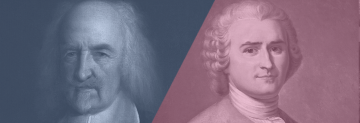Robin Douglass in iai:
 In 1651, Thomas Hobbes famously wrote that life in the state of nature – that is, our natural condition outside the authority of a political state – is ‘solitary, poore, nasty brutish, and short.’ Just over a century later, Jean-Jacques Rousseau countered that human nature is essentially good, and that we could have lived peaceful and happy lives well before the development of anything like the modern state. At first glance, then, Hobbes and Rousseau represent opposing poles in answer to one of the age-old questions of human nature: are we naturally good or evil? In fact, their actual positions are both more complicated and interesting than this stark dichotomy suggests. But why, if at all, should we even think about human nature in these terms, and what can returning to this philosophical debate tell us about how to evaluate the political world we inhabit today?
In 1651, Thomas Hobbes famously wrote that life in the state of nature – that is, our natural condition outside the authority of a political state – is ‘solitary, poore, nasty brutish, and short.’ Just over a century later, Jean-Jacques Rousseau countered that human nature is essentially good, and that we could have lived peaceful and happy lives well before the development of anything like the modern state. At first glance, then, Hobbes and Rousseau represent opposing poles in answer to one of the age-old questions of human nature: are we naturally good or evil? In fact, their actual positions are both more complicated and interesting than this stark dichotomy suggests. But why, if at all, should we even think about human nature in these terms, and what can returning to this philosophical debate tell us about how to evaluate the political world we inhabit today?
The question of whether humans are inherently good or evil might seem like a throwback to theological controversies about Original Sin, perhaps one that serious philosophers should leave aside. After all, humans are complex creatures capable of both good and evil. To come down unequivocally on one side of this debate might seem rather naïve, the mark of someone who has failed to grasp the messy reality of the human condition. Maybe so. But what Hobbes and Rousseau saw very clearly is that our judgements about the societies in which we live are greatly shaped by underlying visions of human nature and the political possibilities that these visions entail.
As it happens, Hobbes didn’t really think that we’re naturally evil. His point, rather, is that we’re not hardwired to live together in large scale political societies. We’re not naturally political animals like bees or ants, who instinctively cooperate and work together for the common good. Instead, we’re naturally self-interested and look out for ourselves first and foremost. We care about our reputation, as well as our material wellbeing, and our desire for social standing drives us into conflict as much as competition over scarce resources.
More here.
